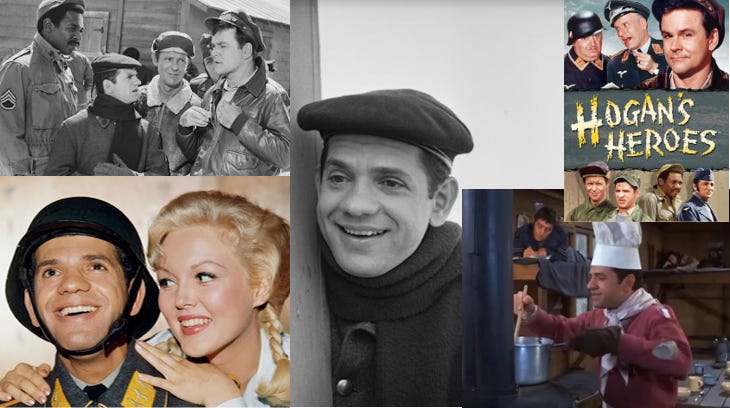‘Au Revoir, Colonel’: A Tribute to Hogan’s Heroes’ ‘LeBeau’
Yesterday the death of Robert Clary, a French actor most famous as Cpl. Louis LeBeau in the comedy TV show Hogan’s Heroes, was announced. The series ran 1965 to 1971, and most of the original cast is dead now. But I wanted to pay tribute to “LeBeau”—not just as a charming character in a popular sitcom about Allied POWs hilariously outwitting Nazis, but as a person who really survived the Nazi Holocaust at Auschwitz.
Hogan’s Heroes was a big part of my childhood and my mother’s. She remembers watching it with her dad and his Jewish neighbors (who had escaped Europe and the Nazis) when she was young. Later, my siblings and I watched it with my grandpa and, after he passed away, my great-uncle. Laughing at US Col. Hogan’s exploits with his team of American, French, and British POWs under the noses of the bumbling Nazis was a family event. To this day, we still quote famous lines from the show to each other, knowing we’ll all get the reference without context. To me, Hogan’s Heroes and thus LeBeau were always bound up with memories of people I love.
But Nazis were no joke to Clary when he was young. Before Robert Clary was a beloved American sitcom character, he was a Jew imprisoned in the infamous Nazi death camp of Auschwitz.
“[New York Post] Born Robert Max Widerman in Paris on March 1, 1926, Clary was the youngest of 14 kids born to his strict Orthodox Jewish parents.
When he was 16, he and his family were sent to Auschwitz, where his parents were murdered in the gas chamber.
‘My mother said the most remarkable thing,’ Clary told the Reporter in 2015 about that day. ‘She said, ‘Behave.’ She probably knew me as a brat. She said, ‘Behave. Do what they tell you to do.’”
Mrs. Clary did not survive, but she helped ensure her son did. Clary did not die in the gas chambers, instead being sent to a different concentration camp to work.
“Clary was the only one from his captured family to survive. He wound up incarcerated at the Nazi concentration camp Buchenwald for 31 months, where he made wooden shoe heels in a factory and got the identification number ‘A-5714’ tattooed on his left forearm.
‘Singing, entertaining and being in kind of good health at my age, that’s why I survived,’ he said of singing with an accordionist every other Sunday for Schutzstaffel (SS) soldiers at Buchenwald.
In May 1945, Clary returned to France and sang in dance halls. Four years later, he headed to Los Angeles to record for Capitol Records and, in 1950, appeared in a French comedy skit on a CBS variety show hosted by comedian Ed Wynn…Clary, who starred in ‘Hogan’s Heroes’ on CBS from September 1965 to April 1971, waited 36 years to publicly discuss his Holocaust experiences.
‘I had to explain that [‘Hogan’s Heroes’] was about prisoners of war in a stalag, not a concentration camp, and although I did not want to diminish what soldiers went through during their internments, it was like night and day from what people endured in concentration camps,” he wrote in his 2001 memoir, ‘From the Holocaust to Hogan’s Heroes,’ per THR…Clary was married to his mentor Eddie Cantor’s daughter, Natalie, for 32 years.”
Clary evidently did not let his horrific experience ruin him. He was one of two Jewish cast members on Hogan’s Heroes who had escaped the Nazis—ironically, the other, John Banner (“Sergeant Schultz”), played a Nazi on the show. Banner was lucky enough to escape to the US from Austria early on and serve in the US Army Air Corps, but Clary said, “John lost a lot of his family” to the Holocaust. There were other cast members who were European refugees as well.
Today might be a good day to sit down and watch an episode of Hogan’s Heroes. But as you laugh at the jokes (and maybe shake your head at the cornier parts), remember that lively “LeBeau” was more than a talented comedian and actor—he was a Holocaust survivor and hero.




